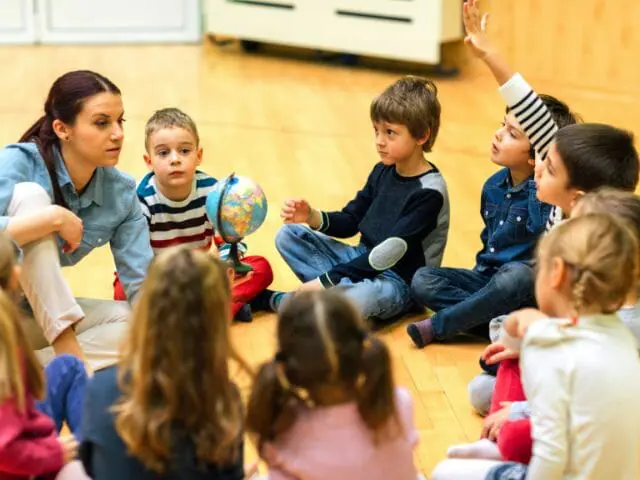I can still recall my first day as a teacher vividly. It was perhaps the most exhilarating day of my life.
I remember it being joyful and fun.
But once that first-day rush subsided, reality set in, then came the self-doubt over my competence and the struggles with having to deal with challenging behavior in class.
I spent more hours working than I should and at one point I even had a crying episode. So here are my teaching tips, the things I wish I knew when I was a new teacher, hope they help save you time, energy and tears.
Find the Balance Between Building Relationships and Classroom Management
Beginning teachers tend to fall into two extremes- one who is all about building relationships with students and the one who is all about classroom management, sticking to the rules, and reinforcing discipline.

Children thrive on relationships and boundaries. Students learn, create, and engage at a deeper level when they feel connected to their new teachers and classmates. And they feel safer when a consistent, classroom management plan is in place.
Be firm when the situation calls for it but avoid micromanaging every deviant behavior. Be genuinely interested in your students’ lives, who they are, and what they care about. You can do this by asking specific questions about their likes and dislikes, praising them when they show curiosity, or just simply chatting with them beyond school topics.
Don’t Hesitate to Seek Helpful Advice
New teachers, even old ones, will never have all the answers. Ask for the support of experienced teachers, especially in your first school year. Ask about their teaching methods, how they foster classroom community or any other general tips for new teachers.

If you’re unsure how to handle parent-teacher conferences or manage problematic behavior in your own classroom, by all means, seek out the pros in your school for the best advice.
Learn to Work Smart
Teacher burnout can easily creep on first-year teachers because they’re still building up their bank of lesson ideas, plans, and materials, so they end up working more than they should.
Of all the tips for new teachers in this article, this is probably the most important. Pay attention to the tasks you have to do repetitively and constantly strive to shorten the time you spend doing them, without affecting the quality of the output.
It can be as simple as having an excel file of all your lesson ideas so you can easily find them again later, preparing a craft supplies box that has everything you need to make your anchor charts, or creating a worksheet or chart template that you just need to customize in a few minutes for a new lesson.
Celebrate Small Wins

A new teacher will make mistakes, it’s part of the experience. In our own lessons, we often teach students with maximum grace. We try to be gentle when they make mistakes so we don’t end up discouraging them. First-year teachers should apply this to themselves too. Do not beat yourself up over mistakes and take time to celebrate your progress. Give yourself little rewards.
Offer Sincere, Genuine Praise
I believe in reinforcing positive behavior through praise, but try not to overdo it. When said too often, praises lose their value and meaning.
I like to challenge and stretch my students to their limits, and then offer sincere, specific praise afterward.
Don’t Compare Yourself to Other Teachers

Avoid comparing yourself to veteran teachers or other new teachers like yourself. Strive to be the best teacher you can be, model the best practices you see, but at the end of the day, be true to yourself.
Accept that you have strong and weak spots, just as other teachers do. Welcome ideas and suggestions but also let your unique identity shine in your teaching.
Learn How to Deal With Parents
Dealing with parents for the first time can be nerve-wracking. How do you talk about a child’s strengths and weaknesses with their loved ones? How do you communicate problematic behavior?
My advice is to back up your feedback with specific examples. For instance, if you want to discuss a child’s writing skills, show the sample work of that child to back up your point. Also, be specific on how parents can support their child’s learning, including concrete tips and examples they can implement.
Make Use of Exit Slips

Exit slips help you assess how well students have understood a topic or lesson. They also give learners the opportunity to reflect on what they have learned, think critically, or just express how they feel about the lesson.
Exit slips can help you with lesson planning and they will also inspire you to come up with lessons or activities that target specific learning needs.
The “Touch It Once” Rule
Prevent overwhelm by tackling tasks right away and not later. If someone needs your signature, take that moment to complete the task. The same goes for grading assignments too. Give assignments that target learning goals and then score them quickly.
Plan for the next day’s class during classroom lull time or breaks. Hopefully, your future self who gets to stop working after the bell rings will thank you later.
Be Friendly

Remember to branch out within your school environment. Smart new educators will befriend the school staff, the co-teachers, and the school volunteers because you never know when their help and support will come in handy.
Let them know that you are a person who values the work that they do and would like to develop relationships with them. A kind word or a thoughtful email will go a long way in fostering a pleasant work environment.
Embrace Your Students’ Realities
Many students come to your classroom with emotional baggage, some lighter or heavier than the others. It would be ideal if students can leave these issues at home and just focus on their lessons when they enter your classroom. But that’s not realistic and can be emotionally damaging too.
Make an effort to recognize your students’ socioeconomic statuses and home situations. This will help you see who needs more support among your students.
Make a List of the Protocols
Don’t let unforeseen circumstances rattle you. Think of challenging scenarios that are likely to happen and ask if they are protocols in place to handle them in advance. What’s the process if a student gets sick in class? In case of fire or earthquake? In case of severe weather? What’s the protocol for bullying incidents? What resources are there for students with learning or behavioral needs?
Jump In: There is much advice readily available for new and old teachers alike but say only one thing: take your vocation seriously and make your teaching fun for kids! I have listed my other most sought-after advice to teachers here. Please take a look at them at your convenience:
- How to Organize Classroom Library: Creating a Reading Space for Primary & Older Learners
- Classroom Routines & Procedure: How to Run an Effective Class Through Modelling Practices
- Emergency Sub Plans
- Teacher Dress Code
- School Appropriate Songs
- Ideas on How to Set Up a Preschool Classroom: Tips to Create a Fun & Safe Space for Kids
- Teaching Character Traits The Right Way (Fun Activities)
Related Questions
How do I handle problematic behavior in class?
This is always on a case-to-case basis. There are situations when calling for the behavior to stop immediately is appropriate, especially if it can be dangerous, hurtful, or damaging. Sometimes I just choose to ignore it because, without the payoff of seeing the class halted or the teacher angry, the disruptive student usually stops and loses interest in being disruptive.
How do I motivate lazy students?
Connect your lesson content to what your students are currently interested in. Do they like a certain song, or a certain TV series? Incorporate those in your lesson activities and see if it sparks them to participate more.
Final Thoughts
So there you have it, hope these pieces of advice for new teachers help you truly fall in love with this profession.
As a final note, remember to have fun! If your students see you genuinely having fun in the lesson, they will end up having fun too. A happy classroom is the best environment for learning and growing, not just for your students, but for you too.
Last Updated on July 24, 2022 by Emily
- Facebook9
- Twitter21
- Pinterest67
- 97shares




